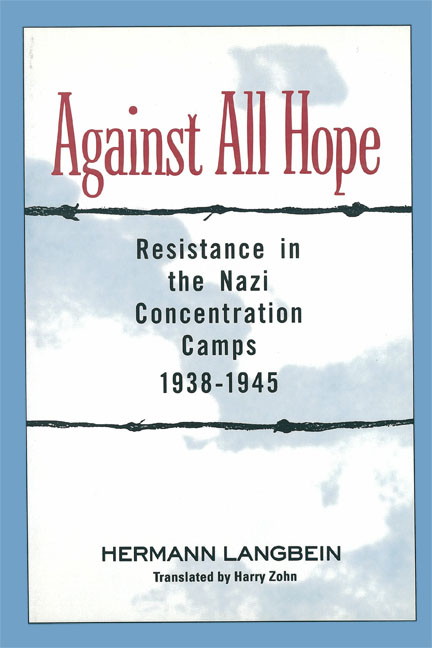Finally in paperback, in this major and comprehensive work, hailed by Le Monde as a "monumental study," Hermann Langbein shatters the myth that all prisoners of concentration camps, during World War II, passively let themselves be slaughtered. A prisoner himself and one of the leaders of resistance at Auschwitz, Langbein painstakingly documents the detailed account of the history of the camps and the story of the resistance. Spanning the initial years to the chaotic weeks before liberation, Against All Hope is the first systematic presentation of organized resistance. Deeply moving, it is an unforgettable testament to the resilience and determination of the human spirit.
"...tells the story of the Jews who resisted their oppressors even in hopeless situations where they were unarmed against the German forces holding them captive. Hermann Langbein tells his own story of standing up in the final days of the war in the notorious camp of Auschwitz, and how he and others made their stand even in hopeless situations. This is a fascinating and uplifting read that should not be missed by history readers."
--Wisconsin Bookwatch: June 2010
"Dissent is a natural part of human nature, and not all of the concentration camp victims did nothing to stop their fate. Against All Hope documents the stories of those who fought back against the Nazi concentration camps within. Author Hermann Langbein brings to light the little-known resistance movements in these many camps. Against All Hope is an uplifting story about those who would not just stand by and let evil be done to them."
--Midwest Book Review
“Inspiring and informative, this book fills large gaps in what we know about resistance in the concentration camps."
--Kirkus Reviews
"Well researched and written. A chapter of the Second World War entirely unknown to American readers. Resistance against the Nazis in the most unlikely places can serve as evidence that there will always be people to fight against tyranny, no matter how limited the opportunities and how great the risk." --Lucjan Dobroszycki, editor of Chronicle of the Lodz Ghetto 1941-1944
“A valuable book that fills a void in the English language literature about concentration camps and especially resistance in the camps. Admirably objective and lucid, Langbein's book draws on his own personal experience and on his meticulous research. This is essential reading.” --Henry Friedlander, editor of The Holocaust: Ideology, Bureaucracy, and Genocide
"...tells the story of the Jews who resisted their oppressors even in hopeless situations where they were unarmed against the German forces holding them captive. Hermann Langbein tells his own story of standing up in the final days of the war in the notorious camp of Auschwitz, and how he and others made their stand even in hopeless situations. This is a fascinating and uplifting read that should not be missed by history readers."
--Wisconsin Bookwatch: June 2010
"Dissent is a natural part of human nature, and not all of the concentration camp victims did nothing to stop their fate. Against All Hope documents the stories of those who fought back against the Nazi concentration camps within. Author Hermann Langbein brings to light the little-known resistance movements in these many camps. Against All Hope is an uplifting story about those who would not just stand by and let evil be done to them."
--Midwest Book Review
“Inspiring and informative, this book fills large gaps in what we know about resistance in the concentration camps."
--Kirkus Reviews
"Well researched and written. A chapter of the Second World War entirely unknown to American readers. Resistance against the Nazis in the most unlikely places can serve as evidence that there will always be people to fight against tyranny, no matter how limited the opportunities and how great the risk." --Lucjan Dobroszycki, editor of Chronicle of the Lodz Ghetto 1941-1944
“A valuable book that fills a void in the English language literature about concentration camps and especially resistance in the camps. Admirably objective and lucid, Langbein's book draws on his own personal experience and on his meticulous research. This is essential reading.” --Henry Friedlander, editor of The Holocaust: Ideology, Bureaucracy, and Genocide






